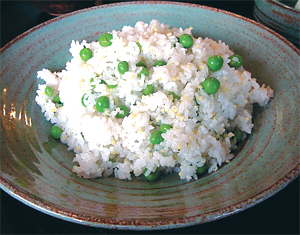AGRA and JICA are entering into a long-term pact that builds on the strengths of each organization to reach their ambitious goal. The pact will be formalized at the second General Meeting of the Coalition for African Rice Development (CARD), which will be held in Tokyo on June 3-4, 2009. Mr. Kofi Annan, Chair of the AGRA Board of Directors, will attend the signing ceremony, along with Madam Sadako Ogata, President of JICA. Dr. Namanga Ngongi, Agra’s President, and Mr. Kenzo Oshima, Senior Vice President of JICA will sign the agreement on behalf of their organizations.
 |
| A plate of rice Photo:Courtesy |
“In its first year, CARD has been instrumental in nurturing the development of national strategies to increase the productivity and production of rice,” says Dr. Ngongi. “Deepening cooperation between AGRA and JICA is an important step toward significantly boosting rice production by
Africa’s smallholder farmers, which will reduce costly food imports and move the continent further toward food security.”
CARD is a consultative group of major donors, rice research organizations and a number of other development entities, which together are working with 21 African countries to strengthen their ability to produce this valuable commodity. Current CARD members include AGRA, FAO, the Forum for Agricultural Research in Africa (FARA), the International Rice Research Institute (IRRI), JICA, the Japan International Research Center for Agricultural Sciences (JIRCAS), NEPAD and the Africa Rice Center (WARDA). The main target of the CARD initiative is reflected in the Yokohama Action Plan, which was one of the main documents adopted at the recent TICAD IV (The Fourth Tokyo International Conference on African Development) held in Yokohama, May 2008.
Since its inception one year ago, CARD has focused on supporting the efforts of 12 countries to develop more effective National Rice Development Strategies. This “first wave” of African rice producing nations includes Cameroon, Ghana, Guinea, Kenya, Madagascar, Mali, Mozambique, Nigeria, Senegal, Sierra Leone, Tanzania and Uganda.
With the support of the CARD Secretariat, which is hosted by AGRA, all 12 counties have produced the first versions of their strategies. During the CARD meeting, Coalition members will discuss how to best support the national plans while refining them through policy dialogues. In the coming year, CARD will work on similar strategies with the “second wave” of rice-producing countries (Benin, Burkina Faso, Central African Republic, Cote d’Ivoire, the Democratic Republic of Congo, Liberia, Rwanda, The Gambia and Togo).
“Our partnership with AGRA moves JICA further along its critical path of engagement in agricultural development in Africa,” says Mr. Oshima. “We have a rich history of national, regional and international partnerships for change, and CARD’s effectiveness thus far bears witness to the potential of our collaboration. Rice specialists in Japan – indeed, from all over Asia and other parts of the world – are eager to bring their expertise to bear on transforming Africa’s rice sector.”
Currently, the demand for rice in sub-Saharan Africa is double the rate of population growth and, at about 5.8% per year, consumption is growing faster than that of any other major staple food. Across Africa, local production has been unable to keep up with the rate of increase in demand. In the past 50 years, rice production in Africa has increased to 14.60 million tons (from about 3.14 million tons), much of that increase based on expanding the area devoted to the crop. During the same five decades, Asia has increased rice production on a much grander scale, to about 570 million tons (up from some 200 million tons), with most of this coming from higher yields on existing farmland.
“Rice is quickly becoming a major staple food for urban and rural consumers alike,” says Mr. Hiroshi Hiraoka, Coordinator of the CARD Secretariat. “African production increases, which have been achieved mainly by expanding the area devoted to rice, are not keeping pace with demand.”
CARD aims to improve African rice productivity by taking a holistic approach – promoting change both on small-scale farms (for example the increased use of modern inputs and farming practices), as well as off farm by advocating post-harvest value chain improvements, increasing access to markets for small producers, and promoting enabling policies. “Our goal is to double Africa’s rice production in 10 years,” Mr. Hiraoka says, “To accomplish this, specialists from the rice-producing countries of Sub-Saharan Africa and the rest of the world need to work together, systematically sharing their experiences and knowledge about how to promote rice in Africa. Making such cooperation a reality is the purpose behind the long-term agreement being signed by JICA and AGRA.”
The MoU between JICA and AGRA will strengthen their cooperation to promote rice development in Africa and to increase the flow of support to African institutions engaged in this work – all toward the realization of achieving an African Green Revolution.
The rice production situation in Africa mirrors the general food production challenges facing the continent – as well as the opportunities for overcoming them. AGRA’s goal is to transform smallholder agriculture through: development and widespread use of modern farming technologies and methods; promotion of appropriate policy environments; large-scale changes in soil management; and better access to local, national and regional markets. Achieving that transformation will require a large number of innovative and dynamic partnerships such as that with JICA, and increased financial support for African agriculture. The JICA/AGRA pact is a long-term commitment and represents for both organizations a determination to revolutionize rice production in Africa. This is a critical step toward improving food security and reducing poverty for millions of Africans.
For more information, contact:
Stella Kihara in Nairobi: +254 735 380 199
skihara@agra-alliance.org
Tomohiro Ono (Mr.) in Tokyo: +81 (0)3 5352 5437
Ono.Tomohiro@jica.go.jp
Fujiwara (Mr.) in Tokyo: +81 (0)3 5352 5527
Fujiwara.Kazuyuki@jica.go.jp


